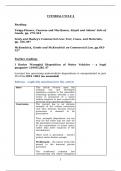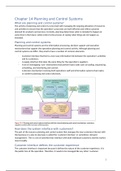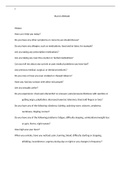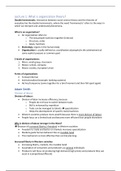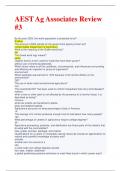Reading:
Twigg-Flesner, Canavan and MacQueen, Atiyah and Adams’ Sale of
Goods, pp. 279-324
Sealy and Hooley’s Commercial Law: Text, Cases, and Materials,
pp. 356-397
McKendrick, Goode and McKendrick on Commercial Law, pp.493-
527
Further reading:
I Davies ‘Wrongful Disposition of Motor Vehicles – a legal
quagmire’ [1995] JBL 47
[current law governing motorvehicle dispositions is encapsulated in part
III of the HPA 1964 (as amended)
Reform – explicitly mentioned in the article
Intro This article focuses upon the
common law and developed
legislative position to the ostensible
ownership problem whereby a non-
owner in possession of a motor
vehicle purports to pass a good title
in favour of an innocent purchaser
Conclusion The current law is an extreme
example of the civilian possession
vaut titre doctrine because factual
possession is deemed to be
prescriptive
Thus, wrongful dispositions are too
easy for the seller and too safe for
the imprudent private buyer because
of the requirement of actual notice
rather than mere suspicion of the
encumbrance
Other level is piecemeal – doesn’t
protect motor dealers enough
Problematic – the nature of the title
passed to the innocent private
purchaser
The traditional common law
conveyancing rule which champions
1
, security of property can be
prejudicial to innocent purchasers
including motor dealers
A compulsory registration system
can be of real benefit – provides a
more reliable, cost effective
mechanism than a paper based
instrument
If preference is given to the
purchaser, dishonesty is encouraged
Summary The current mechanisms for balancing interests of motor
financiers as owners and prospective purchasers are inadequate
since they fail to provide sufficient notice of the respective
interests involved
An ownership register would constitute a valuable consumer
protection device in that it would alert consumers about the
general condition of the vehicle
A Foster ‘Sale by a non-owner: striking a fair balance between the
rights of the true owner and a buyer in good faith’ (2004) 9 Cov LJ
1
Starting point in law = true owner’s rights are paramount – but many
exceptions have been created to this rule by both common law and
statute
Intro Unsatisfactory situation – the law
has been developed in a piecemeal
fashion and has been interpreted
restrictively, and often
inconsistently, by the courts
Article examines whether the various
statutory exceptions to nemo dat –
designed to provide a balance
between the claims of both innocent
parties rather than redressing the
law in favour of security transactions
– operate fairly
Conclusion The current situation is governed by Nemo dat still has a role to
complicated legal rules and play and its need is clear,
exceptions determining the scope of but the exceptions often
the rules and the protection offered fail to represent either a
to owners or purchasers. rational or cohesive set of
principles for balancing
The rules should be led by fairness conflicting interests
rather than technical legal niceties
The rules and their
Presently, there are clear problems exceptions should ensure
with inconsistencies in the cases, fairness, even though the
especially in the area of estoppel and achievement of total
the distinction between void and fairness may in some cases
voidable contracts be impossible – the law
2
, may have to elevate the
If initial legal position is to remain, claims of weaker parties,
then the law must ensure that the such as consumer buyers,
exceptions to it are applied logically above the true owner’s
and clearly, allowing the true owner claim
to prevail in justified circumstances
The inevitable unfairness created by
the rogue is often compounded by
the uncertainty and iniquity of the
present law
Main points Case of Shogun Finance
Summary Talks about reform
The present law creates unfairness, uncertainty and iniquity
L. Merrett, The Importance of delivery and possession in the
passing of title, [2008] CLJ 376.
Intro The rules are clear, but they are not Article considers two of
necessarily fair nor in keeping with the statutory exceptions
the needs of modern commerce and embodied in ss.24 and 25
trade SGA and ss.8 and 9 FA
Goods may not last forever and it
must be possible to deal with them
efficiently and quickly
Conclusion The exceptions to the nemo dat rule
contained in ss.24 and 25 SGA are
both based on the possession of
goods – the judgements on the
character in which that possession is
to be held are to some extent
inconsistent and cannot be
reconciled with any policy issue.
The nemo dat rule should be
overridden only when the possession
of the seller or ex seller in s.24 and
the buyer in s.25 is attributable to
the sale itself.
The relevance, if any, of constructive
delivery to the question of whether a
seller continues in possession for the
purposes of s.24 SGA has never been
satisfactorily examined.
Main points
Summary
Goode, Ownership and Obligation in Commercial Transactions
(1987) 103 LQR 433
Which cases were mentioned?
3

